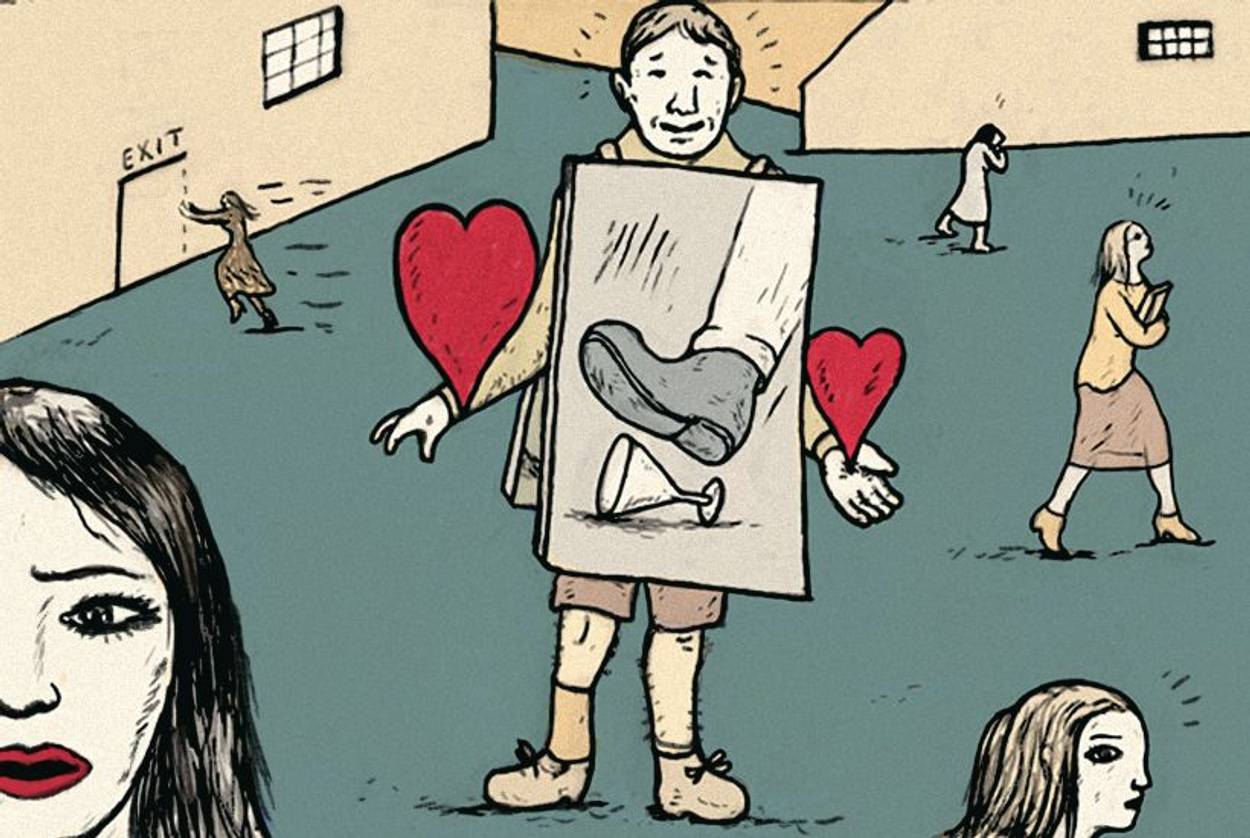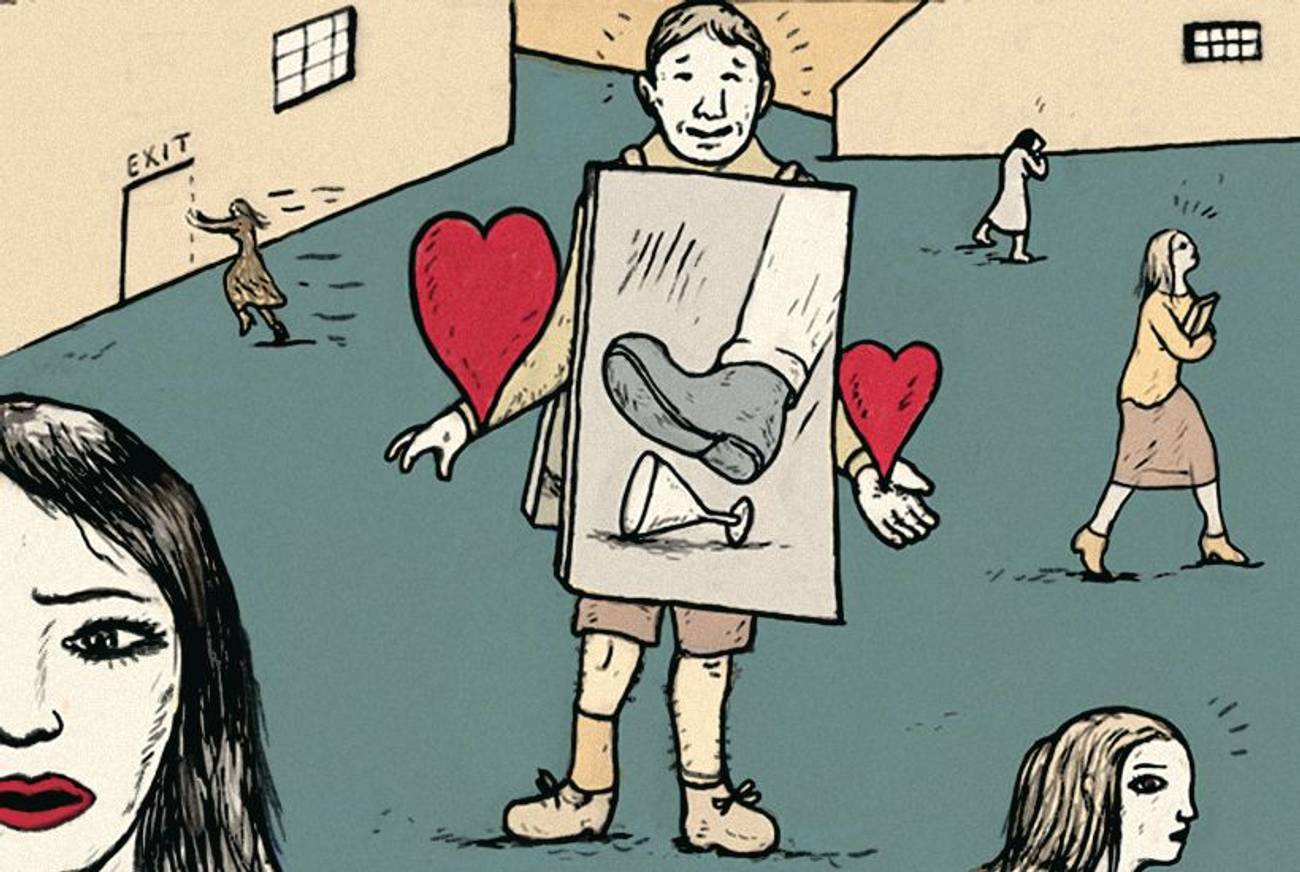My Jewish Dating Problem
I’d given up on finding a Jewish woman to marry—until the woman I fell in love with decided to convert




Our wedding took place on Aug. 23, 2009, on the shores of Lake Winnipesaukee in New Hampshire. Friends and family recited the seven blessings. We exchanged rings. We drank the wine. The rabbi pronounced us married. I stomped on the glass with great vigor. It was the day I’d long hoped for, marrying a nice Jewish girl.
But when I first met my wife, she wasn’t Jewish. In fact, by the time we’d started dating, I’d given up on Jewish women, and my dream of a perfect Jewish wedding, altogether.
Jewish women weren’t the problem—I was. The intense pressure I felt to date and marry within the tribe damaged my perception of Jewish women and my ability to be myself around them. I was only able to relax around non-Jewish women, because I didn’t feel the same pressure; that’s how I met, and fell in love with, my wife. Unlike me, she hadn’t dreamed of meeting someone Jewish and having a Jewish wedding. But as I fell in love with her, she fell in love with me—and with my Judaism as well.
Soon after my bar mitzvah, just as I was discovering my interest in the opposite sex, I began to be bombarded with information about intermarriage—about how one in every two Jewish people would marry a non-Jew and how more than half of the children of those unions would not be raised Jewish. This information was pounded in from all directions, from rabbis, from my parents, my grandparents, Hebrew High School, Camp Ramah. I felt the pressure: The future of my people was at stake! I resolved that I would only go out with Jewish girls.
In high school, this decision proved to be mostly moot. I had difficulty finding dates, period. Pretty much everyone I asked out rejected me. I attributed this to the fact that I was kind of nerdy: My extra-curricular activities included musical theater, video games, and Dungeons & Dragons, not exactly the types of things that made a guy popular with the ladies. I hoped things would be better in college.
I went to study at Oberlin in 1999. The school was arty, musical, nerdy, and had a substantial Jewish population. But a funny thing happened. Even though I no longer felt outside the norm, I still had trouble getting dates … with Jewish women. Every Jewish woman I asked out on a date rejected me. I had numerous opportunities, on the other hand, to date non-Jewish women. I tried not to follow up on them at first, but I was frustrated and lonely and had finite willpower. After one date, though, I would beat myself up mentally for breaking my rule, and I’d avoid making second dates.
But even while my relationships with non-Jewish girls fizzled, I still didn’t have any other options. Jewish girls often were interested in Jewish guys—many of these girls ended up dating and even marrying Jews; they just weren’t interested in dating high-pressure, community-survival minded, intense, and awkward me. By the time I graduated, I’d still never been in anything approaching a serious relationship. I left Oberlin as I came to it: single.
I had made some good friends, though. While I was at school, I joined an online discussion forum where I began to chat with a non-Jewish girl named Alicia. She lived in New Hampshire, shared all of my nerdy hobbies, had a great sense of humor, and looked like a younger blonde version of geek icon Gillian Anderson from The X-Files. She had a great sense of humor, a wonderful smile, and an honesty that I found refreshing. She was also unbendingly ethical, deeply scholarly, and emotionally supportive—virtues I’d always believed essential in a prospective girlfriend or wife. Since she wasn’t Jewish, though, a relationship with her didn’t seem possible; I thought of her as simply a good friend. We would chat with each other online virtually every day while I was in college, and even after I graduated. But we had never met, much less gone on a date.
After college I became desperate. I created an online dating profile on eHarmony, hoping that its mystical personality matching system would somehow do the job that I had proven unable to accomplish on my own. Before long the site gave me a listing of potential Jewish candidates. Though I was excited by these possibilities at first, the resulting dates could best be compared to Seinfeld episodes. One of my dates somehow managed to steer every discussion, no matter how unrelated, to the topic of cheesecake. Another had no discernible personality or strong feelings about anything, leading to a date in which I she responded to everything I had to say with an affectless “yeah” or “uh huh.” But it wasn’t all their fault: I can’t say that I created the most enticing profile. Most of the women the site matched me with wouldn’t risk even a simple online chat with me. Meanwhile, more and more of my friends were getting engaged, more and more of them started families, and I had never dated anyone for more than a few weeks. After a year of failures, I quit the site. If Jewish women weren’t attracted to me, I’d go find women who were.
This was my ulterior motive when I planned a trip up to New England. I was planning to stay with a friend from college for a few days, but I also arranged to meet Alicia, whom I’d known online for five years by that point but had never met in person. When she arrived at my friend’s house, her hair was dyed red and she was dressed in a black suit: very Agent Scully. We hit it off in person as well as we had online. We went out for Thai food with my friend and his wife. It felt very much like a double date between two married couples, even though the meeting was hardly planned that way. By the end of the weekend, we were officially dating.
Judaism is and always has been at the core of my identity. My paternal grandparents survived the Holocaust and met at a displaced persons camp in Landsberg, Germany, before they moved to the United States. My father spent his entire professional life working for Jewish Federations across the country. As a child, I grew up in Conservative congregations in Georgia, New Jersey, and Minnesota, was educated in Jewish day schools from kindergarten through fifth grade, and spent most of my childhood summers at Jewish summer camps. As an adult I have written for Jewish newspapers and teach in a synagogue.
Religion was not a big part of Alicia’s life. She would usually say that she was “not an atheist” or that she was a non-practicing Methodist. I went to a Christmas at her family’s house and it felt less ritualistic than my family’s Christmas Eve Chinese-food-and-a-movie tradition. Even as our relationship became more serious, I did not want to push her to convert, yet I kept hoping she would become interested in the religion on her own. It felt wrong for me to pressure her, yet at the same time I knew that if she didn’t convert, the relationship would almost certainly have to end at some point. I was eager to find a wife, but I couldn’t have children that wouldn’t be Jewish. It was too important to me. So, even though I wanted it and believed it could work, marriage was off the table so long as Alicia was still a gentile.
My parents liked Alicia, but not the fact that she wasn’t Jewish. My paternal grandparents were more concerned; I promised them that I would only marry a Jewish girl. On the other hand, my grandmother on my mother’s side was actively rooting for us as a couple and was the first person to predict that we would get married
The relationship became shorter-distance when Alicia attended Rutgers School of Law in Camden; we were both in New Jersey, at least. Instead of visiting her once a month, I went down from Livingston to Camden once a week. One visit, I found a giant stack of books on the counter. This was hardly unusual. Alicia is and always has been a voracious reader. What was unusual was the subject matter of the books: Judaism. Before I could ask her why she was so interested, she asked me for recommendations on other books. I recommended Joseph Telushkin’s Jewish Literacy. By the next week she had read it and had a new pile of books on Judaism on her counter, then another pile the next week.
On some level, I was confident that once she decided to study Judaism, she would become enthralled with it and want to convert. I think that Judaism was waiting for her to find it. I’m not going to pretend that I didn’t influence her to convert, even if I never overtly made such a request. She knew how important Judaism was to me. I also have no doubt she started reading the pile of Jewish books because of me. In the end, however, the decision to convert was hers.
She began the conversion process during her second year of law school, much to the joy of my parents and grandparents. The conversion was completed at the beginning of her third. The rabbi said that she knew as much about Judaism as a first-year rabbinical student. I proposed to her in September 2008, the same month her conversion was completed. Eleven months later, we had our perfect Jewish wedding.
I often wonder why I went through years of wandering through the desert filled with Sarahs, Rebeccas, Rachels, and Leahs only to marry a Ruth. Why did my decision to only date Jews end up so disastrously?
I think the decision itself was part of the problem. It split the women in my life into two categories: those I could date and those I could not. As a result, I was a much more natural and relaxed person among the non-Jews I felt no pressure to impress, whereas my relationship with Jewish women was always fraught with an intense sense of importance: Maybe this would be the one who would end my isolation. I’d be seized with nerves, I’d feel the need to make grand gestures that I thought were romantic but in retrospect probably came across as desperate. There was nothing wrong with my normal self. But “Howard-in-search-of-a-date” was an entirely different, socially awkward mess of a person. My vow to date only Jewish women had turned people into possibilities and turned me into someone I don’t like very much in retrospect.
At the same time, I consider myself rather lucky. I hadn’t rejected Judaism. And in Alicia I recognized someone who shared my values, if not my religion. Indeed, she shared the two Jewish values I find most important: a strong sense of ethics and a profound love for knowledge. They were part of what I came to love about her, and they were part of what she came to love about Judaism.
Even if Alicia’s grandmother was a little bit confused about why we couldn’t get married in a church, her family was mostly supportive. Her mother even got to choose her Hebrew name. Now the familial pressure has gone from marrying a nice Jewish girl to having nice Jewish kids. Hopefully they’ll be as nice as their Jewish mother.
Howard Kleinman has written for the Forward, New Jersey Jewish News, Spike TV, and CBS Sports.